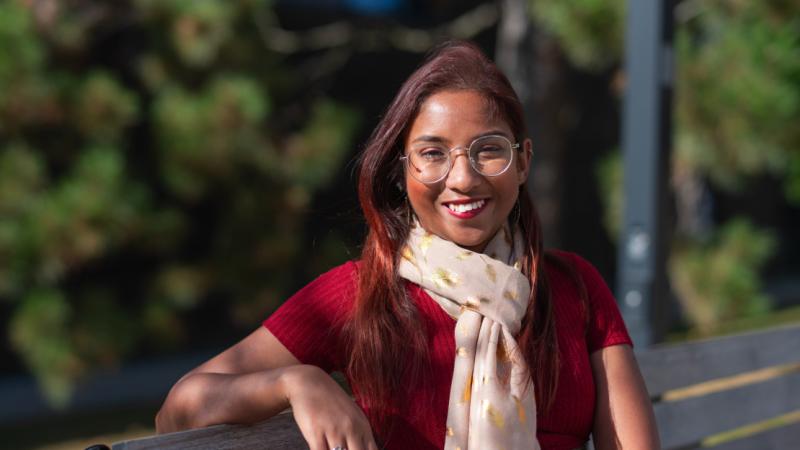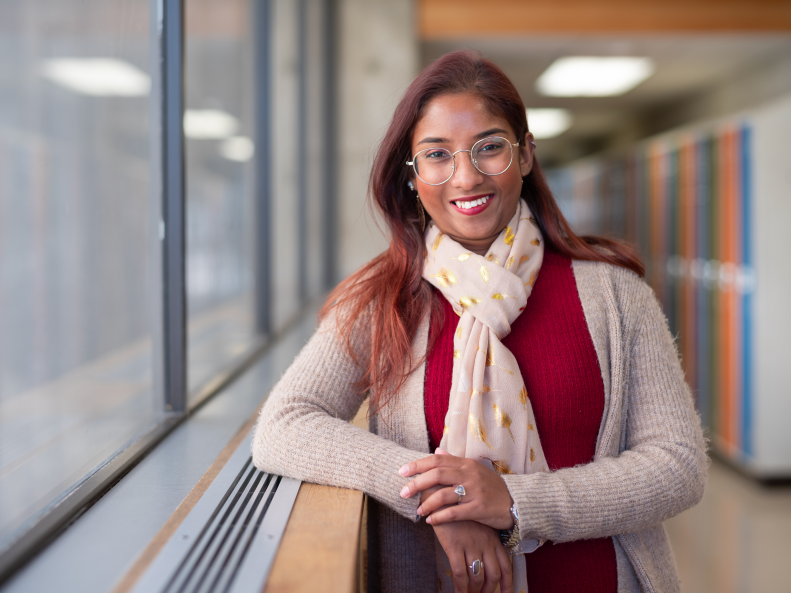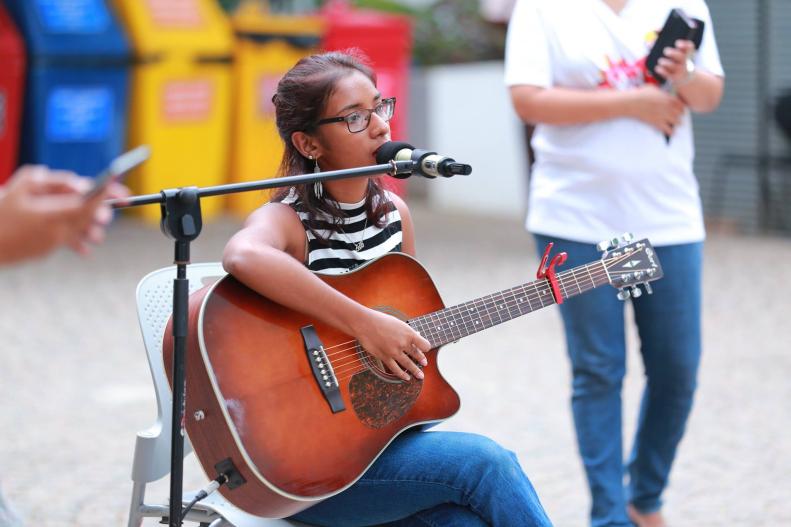November 5, 2024 | Alumni
This new grad had to start all over after pursuing an illegitimate degree. Now she’s making waves in research
By Alexa Battler

Rashmi de Silva Wijeyeratne is graduating with a degree in psychology after a tumultuous start to her post-secondary education. Photo by Don Campbell.
A couple months before she was set to graduate from a bachelor program in Sri Lanka, Rashmi de Silva Wijeyeratne found out the degree she’d spent three years working toward wasn’t accredited.
She’d studied at a school affiliated with a university in the U.K. and she and her classmates had been told they would earn the same degree despite being in Sri Lanka. When she visited the U.K. for her sister's graduation, she toured the campus just for fun and found out that wasn’t true.
“If the university doesn’t vouch for the quality of the degree, you can't apply for a master's or any further study. So, you are essentially stuck at that level,” she says.
Wijeyeratne was devastated, yet still calls herself lucky – she’d realized the illegitimacy of her degree with just enough time to drop out. She’d always planned to do her master’s in Canada, where many schools don’t recognize unaccredited degrees. Many major Canadian universities also don’t allow students to complete a second undergraduate degree in the same field, whether their first degree is accredited or not.
If she’d finished her program, things would have gone very differently for Wijeyeratne. Instead, she dropped out, applied to U of T Scarborough’s Arts and Science Co-op program and at the age of 23 was a first-year psychology student again.
“A lot of people ask me, ‘How did you restart?’ I think so many of us are capable of so much more in terms of resilience. When we are faced with a situation, you don't just give up, you want to fight, you want to try again,” she says. “It was hard, but I didn't see giving up as an option.”

She began her studies virtually from Sri Lanka in 2020 when the pandemic was in full swing and came to Canada the next month as soon as borders began tenuously opening. She spent two weeks quarantining in a Toronto hotel, but right when she was allowed to leave, her grandfather died. There was no way for her to make it to the funeral on time, since she’d need to quarantine again on her return. She couldn't see her family for two years as travel restrictions fluctuated, making her fear she might get trapped outside the country.
Though she spent much of her first months in Canada alone, she threw herself into her academics and campus groups, all through her computer screen. Once vaccines rolled out and restrictions eased, her parents came to visit and she got to work reviving multiple campus groups back to their pre-pandemic activities, including as vice-president then president of the UTSC Glee Club.
She never used to think of herself as a scientist – she says she was an arts kid and her family has long been prominent performers in Sri Lanka’s musical theatre scene. She still found a love of biology, clinical medicine and health care, solidified as she worked her way up the campus’ Emergency Medical Response Group (better known as EMRG) to become a trained on-campus emergency first responder.
She’s volunteered in several labs, including with the Meyer Lab at the Centre for Addiction and Mental Health (CAMH) during her co-op placement, and was even listed as a co-author on the first study to find a natural supplement that reduces postpartum depression.

She most recently worked as a lab co-ordinator in the TEMPO Lab, where she previously completed a work study position as a research assistant, with her former supervisor and boss Laura Cirelli, assistant professor in the Department of Psychology. The lab is a combination of several of Wijeyeratne’s interests – it’s dedicated to investigating the psychological impact music has on babies and children. Wijeyeratne calls her experience completing her thesis and Cirelli’s mentorship “life-changing.”
At Cirelli’s encouragement, Wijeyeratne presented her thesis this summer at the Society for Music Perception and Cognition conference, the largest North American conference in music and cognition. Her project was an investigation into how grandparents connect with their grandchildren over Zoom.
“One of the most rewarding parts of being a professor at U of T Scarborough is working with and getting to know passionate students like Rashmi,” Cirelli says. “It was especially inspiring to see Rashmi shine at the conference this summer. She presented with clarity and pride.”
Wijeyeratne is now graduating at age 27. In November, she’ll be starting a new position as a research analyst in CAMH’s emergency department on Toronto’s Queen Street.
“It's been such a non-traditional trajectory towards getting here,” she says. “But my proudest achievement is being able to make my family proud. I’m so grateful for their love and support and I would not be where I am without them.”
Originally published by University of Toronto Scarborough News

